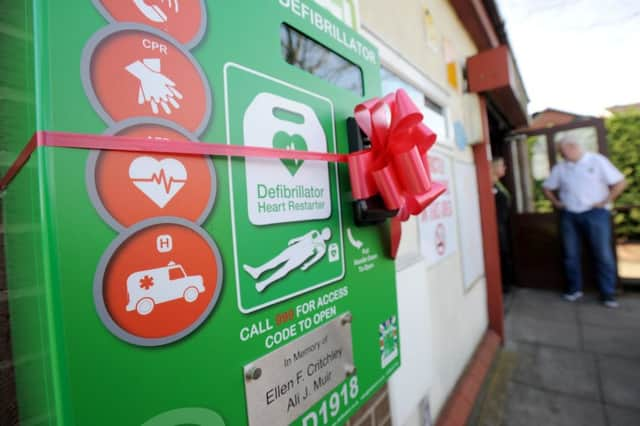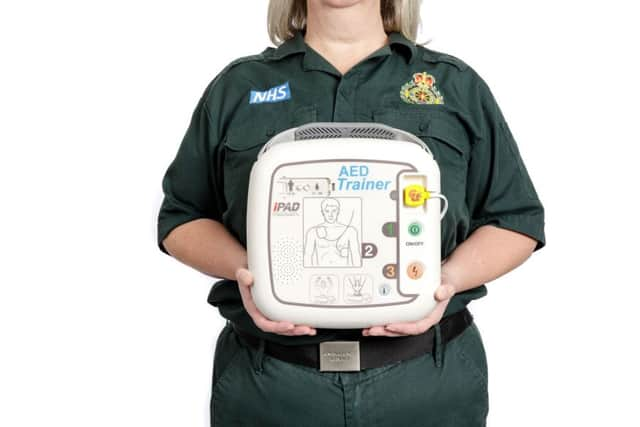Those moments of drama that break the silence and bring Yorkshire strangers together – David Behrens


I can quite understand the concern of the Beverley MP, Graham Stuart, that lives are being lost unnecessarily because bystanders are afraid to apply pressure to the chest of someone in cardiac arrest in order to attempt resuscitation.
Advertisement
Hide AdAdvertisement
Hide AdMr Stuart is behind a campaign to make defibrillators available more widely in his East Riding constituency, but is hamstrung by the revelation that two people in three would apparently watch someone in pain and wait for an ambulance to arrive rather than try to intervene. This is despite the advice that with every passing minute without CPR and defibrillation, the chance of the patient’s survival decreases by something like 10 per cent.


It pains me to admit – fortunately only hypothetically – that I would not be the one person in three to be of any use in such a situation. Maybe in a real emergency, I might be galvanised into action but, in all probability, I would surrender to the British stereotype of not wanting to get involved.
I know only vaguely how CPR is supposed to work; I would worry that I’d get it wrong and make matters worse, and then be taken to court for my cack-handedness to be laid bare.
Advertisement
Hide AdAdvertisement
Hide AdI’m sure this is not an exclusively Yorkshire trait, but our taciturn nature doesn’t help matters. It is often said that people here are friendlier than in London, but friendliness doesn’t necessarily mean speaking or otherwise getting involved unless asked.
I have been struck, over the last few years, by how different the mindset can be elsewhere. On a street in central Liverpool a few months ago, it took only an unresponsive parking machine to galvanise several of us into action.
Advertisement
Hide AdAdvertisement
Hide AdTwo people were already discussing how to make it work when I bowled up to try my luck. Bound by a common purpose, we behaved as if we had known each other all our lives.
That would never happen in Yorkshire. Here, when a parking machine fails to work, which is every time, we grunt at each other in mutual resignation, shrug our shoulders and go about our business.
I had become used to the different way of life on the Mersey when my son went to live there. He hadn’t known it long when, with his ankle in a cast, he hobbled awkwardly towards Lime Street Station and found himself in conversation with a sympathetic stranger.
They chatted for five minutes until it was time to catch the train, at which point Behrens junior made for the platform. “Run, Forrest, run,” shouted the stranger, as he disappeared into the distance.
Advertisement
Hide AdAdvertisement
Hide AdThat brand of instant and unconditional camaraderie may be unique to Liverpool. I certainly don’t remember it as a trait in Manchester, where the natives are neither funny nor friendly. I grew up there but feel little affection for it.
This time last year, a couple of my son’s friends from his new home were our house guests, and I made a point of showing off the landscape. It wasn’t the dry stone walls but the fish shops that seemed to surprise them most, as they had done me in the 1970s. No Holland’s pies, burgers or saveloys – just fresh haddock, fried in dripping, the way the Lord intended.
Constants like that across the years are reminders that while it’s easy to find parts of our county in which life has gone downhill, it’s easier still to see where it hasn’t.
Before he went off to Liverpool, I spent a few days taking my son around the villages of the Yorkshire Wolds, a glorious backwater that has remained largely unspoilt by tourism or much else. Arriving at one chocolate box village in the East Riding, where cottages with thatched roofs bordered the green, he said that he hadn’t realised such places still existed. Where he lives now, they don’t.
Advertisement
Hide AdAdvertisement
Hide AdOne feature of the Wolds, however, has changed, and Graham Stuart’s campaign may have had something to do with it. Outside even some of the smallest village halls, defibrillators have been placed, with instructions on how to use them. The next time I am there, I’ll have to make a point of reading them. There is little chance of a stranger telling me.